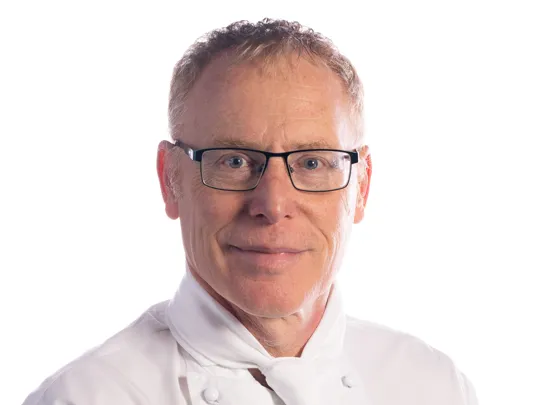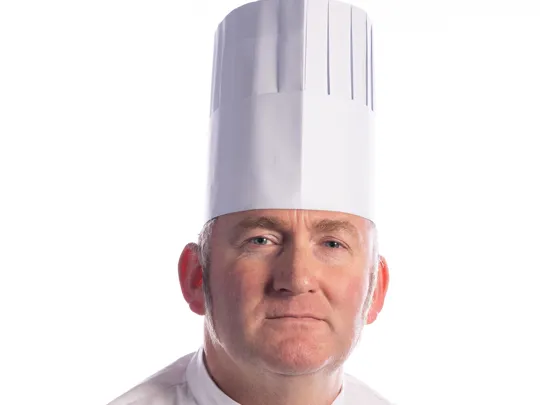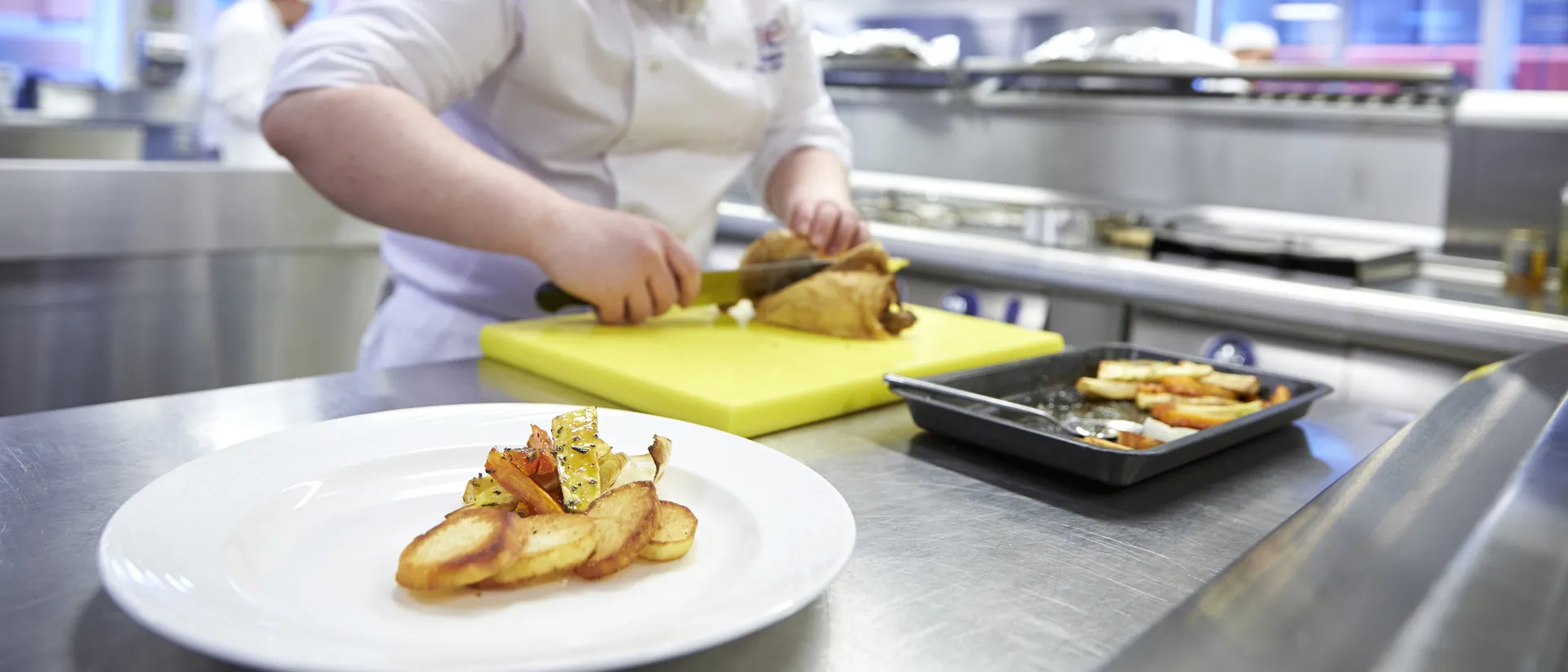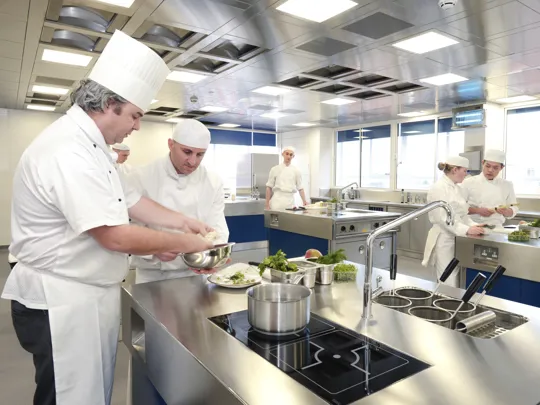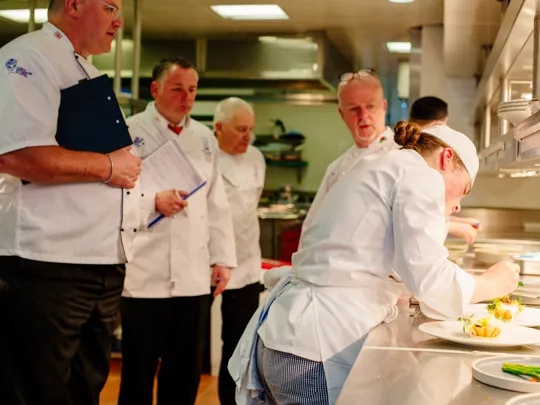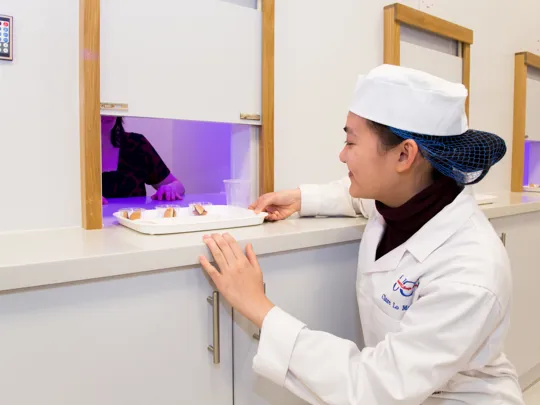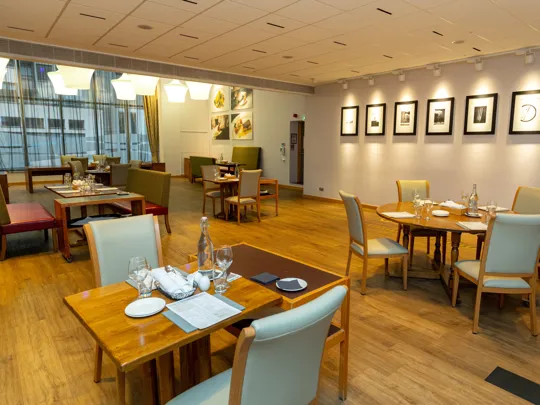of graduate employers say relevant experience is essential to getting a job with them
Why should I choose this course?
- WORK PLACEMENT – Gain valuable real-world experience on placements, with past students having worked at Michelin-starred restaurants and top establishments in locations around the globe
- ENRICHMENT – Engage with industry through activities including guest lectures, demonstrations, masterclasses, visits and further employment opportunities
- EXPERT TUITION – Learn from some of the best chefs and food professionals in the industry while studying in our state-of-the-art kitchen facilities on campus
- NO EXAMS - If you are not keen on exams, this course is for you. Unlike many degrees in this field, you will have no written exams during or at the end of the course and will be assessed through practical assessments and coursework only
- AWARD-WINNING UNIVERSITY – Study at the highest-ranking university in the region according to student choice (Whatuni Student Choice Awards 2023)
Our facilities
University College Birmingham is renowned for its outstanding food industry training facilities. Studying our Professional Chef cookery course means you will have access to our professional standard kitchens, award-winning training restaurant and state-of-the-art food development facilities.
Course breakdown
- Year 1
- Year 2
Core Modules
Advanced Culinary Skills
This is a practical module that focuses on developing your knowledge, speed, precision, and skill in the culinary arts. You will also develop an awareness of how kitchen operations have evolved over time and an overview of the leadership skills necessary to run a contemporary professional kitchen.
Specialist Patisserie
This module is designed to provide you with a detailed introduction to advanced patisserie, focusing on classical production methods and specialist pastry techniques. You will learn how to produce a wide range of patisserie items, petit fours and plated desserts to the highest professional standard. Topics include preparation of specialist pastry products for plated desserts with consideration for allergens, healthier eating, and special diets. You will be challenged to produce modern plated desserts utilising standardised recipes, adapted classical techniques and also considering current market changes.
The Gastronomist
As a professional chef, it is important to have a well-rounded understanding of the industry. This module will build on your understanding of the trends, theories and ideas that matter most, from the history of professional cookery, to the importance of sustainability, provenance, and trend awareness.
The Science of Food
Today's food industry is wrestling with the increasing diverse needs of adapting foods to suit different nutritional needs. This module seeks to take a product and reformulate it to develop products which are responsive to the food market and have commercial value.
Core Modules
Advanced Culinary Techniques
In this module you will learn a range of advanced food preparation methods and presentation techniques. In addition, you will gain an understanding of the principles of menu development, product development and the correct substitution of ingredients to meet dietary needs and special requirements. In addition to this you will start to appreciate the styles and ethos of innovative chefs within the hospitality industry.
Innovative Patisserie
This module has been designed to broaden the knowledge, skills and professional techniques used by pastry chefs. You will be taught a variety of boulangerie products, learning techniques like basic bread doughs, viennoiserie, and sourdoughs as well as the essential theory knowledge. You will also be expected to develop your creative flair and produce a wide range of contemporary patisserie products, producing an afternoon tea for high end establishments, focusing on flavour, texture, and aroma. You will be challenged to produce modern Afternoon tea products utilising standardised recipes, adapted classical techniques but also considering current market trends.
Kitchen Management Techniques
This module will give you a broad overview of the management procedures required in professional kitchens, including supervision, training and legal considerations. You will gain a good understanding of the detailed planning and organisation behind running a successful kitchen team.
Profitable Menu Development
This module is designed to develop your ability to create a menu that responds to customer expectations, culinary trends and the current market challenges. You will also learn about a range of other factors behind successful menu development, including cost control and quality analysis.
The modules listed above for this course are regularly reviewed to ensure they are up to date and informed by industry as well as the latest teaching methods. On occasion, we may need to make unexpected changes to modules – if this occurs, we will contact all offer holders as soon as possible.
Entry requirements
Entry requirements
Academic: A relevant Level 3 qualification in Chef Catering, Professional Chef/Cookery or Food Preparation and Cooking (NVQ, VRQ, VTCT etc.)
Work-based: We also give equal consideration to applicants who are currently in work and wish to apply to University College Birmingham. To apply, you must have a minimum of 12 months' relevant work experience, demonstrating management or supervisory duties. Your application must also include a reference from your line manager supporting your entry to higher education. On some occasions we will arrange for you to meet with the teaching team to ensure your skill sets prepare you suitably to achieve on this programme. For further details, please contact Admissions.
International students
For academic and English entry requirements for EU and international students, please visit the Country Specific Information page.
Please note: As an International Student, when choosing optional placement, a visa extension may be required.
Key information
Teaching and assessment
Note: Indicative information only – actual timetables and assessment regimes will be issued at your induction.
Teaching
Example of a typical teaching week (up to 20 contact hours):
- Lectures – 4 hours
- Small group seminars – 2 hours
- Practical kitchen sessions – 12 hours
- Tutorials – 1-2 hours
You will also need to commit around 20 hours per week for individual study time.
Assessment
Estimated breakdown of assessment for this course:
- Coursework – 50%
- Practical assessment –50%
Our teaching and assessment is underpinned by our Teaching, Learning and Assessment Strategy 2021-2024.
Uniform and kit costs
This course requires a uniform and kit costing approximately £250-300, depending on the items you purchase. (Prices are subject to change each year – exact costs and information on how to order required items will be provided to you prior to enrolment.)
Tuition fees
UK students
If you are a UK student enrolling on a standard-length Foundation Degree or a BA/BSc at University College Birmingham, your 2024/25 academic year fee will be £9,250. A half-year tuition fee is £4,625.
View undergraduate fees
International students
If you are an international student enrolling on a full-time Foundation Degree or a BA/BSc in 2024/25, your fee for this academic year will be £14,000 per year. If you complete a placement year, there will be an administration fee of £500 for a full year or £250 for a half-year placement.
Kick-Start Scheme
As a new student studying this course full-time, you will receive £300 per year through our Kick-Start Scheme (UK students only, eligibility criteria applies). This scheme will support your studies and future career by contributing to course-related materials, uniform or selected items on campus. You may also qualify for an additional £500 per year.
Find out more about the Kick-Start Scheme here.
Unibuddy Community - meet other students on your course
Starting university is an exciting time, but we understand that it can sometimes feel a little daunting. To support you, you will be invited to join our Unibuddy Community, where you can meet other students who have applied for the same course at University College Birmingham, before you start studying here.
As soon as you have been made an offer, you will be sent an invitation email to complete your registration and join the Unibuddy Community. For more information, check out our Unibuddy Community page.
Latest updates
Join the conversation and check out the latest updates at Birmingham College of Food.
| UCB Food Courses |
Work placements
Work placements are vital for gaining real-life experience and for building your confidence and skills before you finish your course – and they may even lead to a job when you graduate. Our Hired team can help find the ideal placement for you.
You will undertake short work experience placements in the second year of your FdA Professional Chef course, offering a potential stepping stone into a career and providing a valuable boost to your CV.
Work alongside experts in your sector
A snapshot of some of the employers we have worked with:
- Carters of Moseley
- Clayton Hotel (formally Hotel La Tour)
- Opheem
- Sky by the Water
- The Edgbaston Boutique Hotel
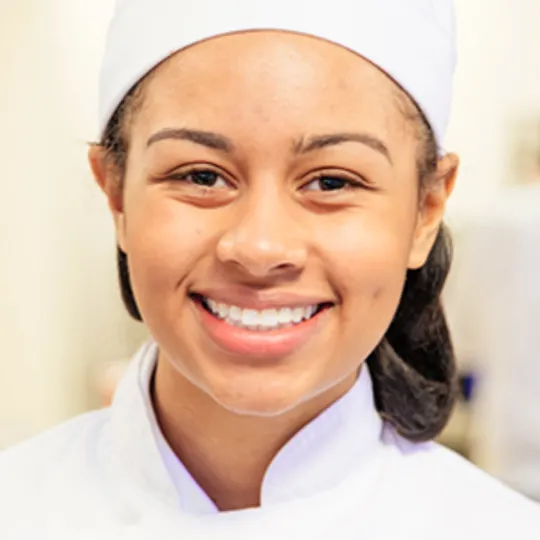
I'm enjoying the added enrichment of the course, including trips and classes such as wine tasting and sensory analysis. The theoretical classes are really interesting and discussion-based. I particularly love The Gastronomist module, which is centred around the food industry as a whole rather than just food and ingredients themselves.
Career opportunities
The example roles and salaries below are intended as a guide only.
Sous chef
Average salary: £30,000 - £40,000
Head chef
Average salary: £35,000 - £50,000
Pastry chef
Average Salary: £21,682
Food technologist
Average Salary: £35,000
Product/process development scientist
Average salary: £32,000 - £40,000
Catering manager
Average salary: £22,000 - £45,000
Want to earn a full undergraduate degree? Completing this FdA will enable you to move onto our Culinary Arts Management BA (Hons) Top-up course.

Yasmine’s Story
Mum-of-four Yasmine wowed the judges on TV show MasterChef by preparing for them the same menu that helped her complete her foundation degree.
What our students on this course say...
100%
of students on this course say that teaching staff are good at explaining things
96%
of students on this course say that feedback helps them improve their work
90%
of students at the University say their course is intellectually stimulating
*National Student Survey (NSS) 2023
Course statistics
FdA
Meet your lecturers
